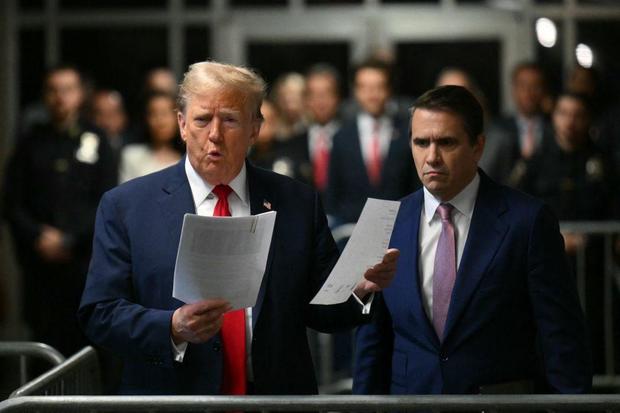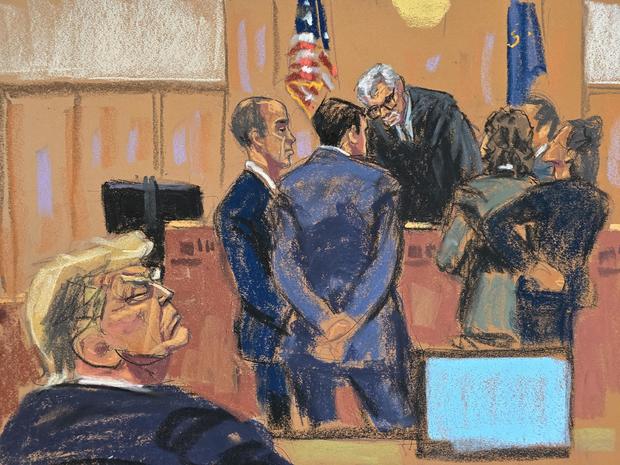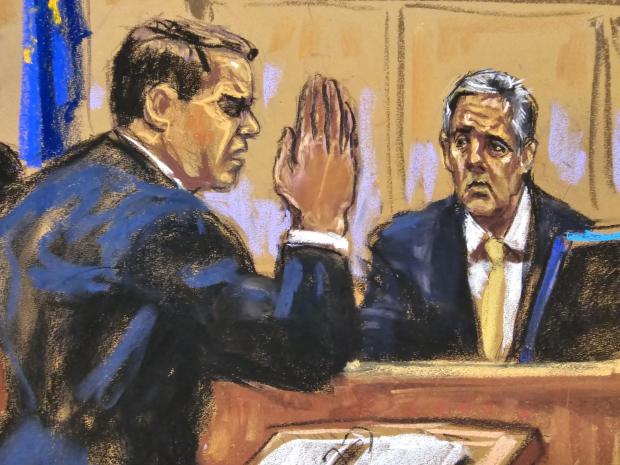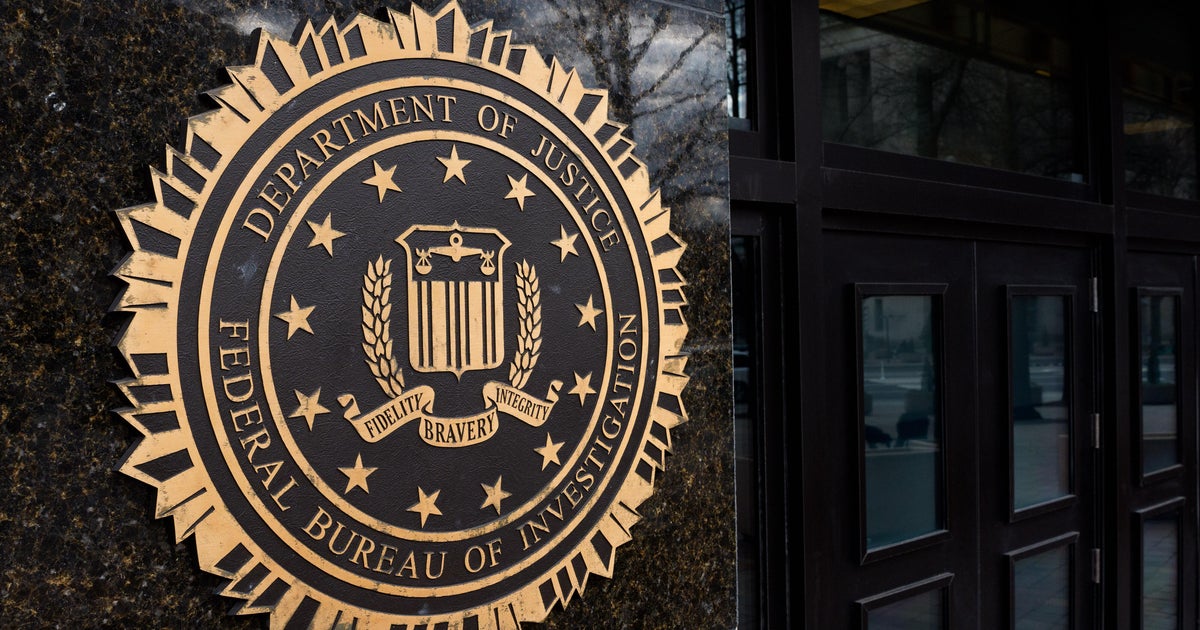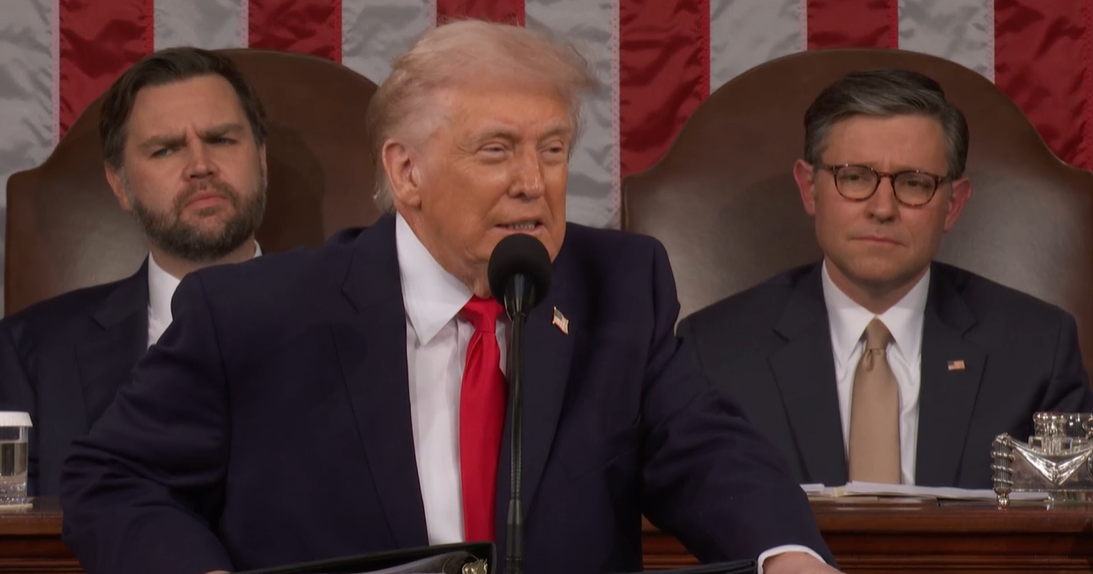Michael Cohen faces sharp questioning at Trump trial as court wraps for the week
The fifth week of Donald Trump's criminal trial in New York ended as it began: with the former president's ex-lawyer Michael Cohen on the stand.
Cohen, the key witness in the case against Trump, faced pointed questions from defense attorney Todd Blanche about his history of lying under oath, his recollection of events that are central to the case, his interactions with the press and what motivated him to turn against his longtime boss.
Seven hours of withering cross-examination painted Cohen, the key witness in the trial, as a habitual liar bent on seeing his former boss jailed, and determined to make money off the case in the meantime.
Trump's attorney played clips of Cohen talking about Trump last year, around the time Trump was indicted by a grand jury in Manhattan.
"I truly f--king hope that this man ends up in prison," Cohen was heard saying in one clip. "You better believe I want this man to go down and rot inside for what he did to my family."
Under questioning from the prosecution earlier this week, Cohen said he hoped Trump would protect him from federal charges if he remained loyal and lied about a $130,000 "hush money" payment to adult film star Stormy Daniels before the 2016 election. Cohen has testified that Trump approved of a plan to reimburse Cohen for the payment over the course of the following year.
Prosecutors allege 34 business records were falsified to cover up the payment to Daniels, and have shown the jury the invoices, vouchers and checks that correspond to each felony charge Trump faces. The former president has pleaded not guilty.
Cohen pleaded guilty to federal charges in 2018 stemming from the deal, including bank fraud and campaign finance violations.
Trump's team said they would continue Cohen's cross-examination on Monday, the next day the trial will meet. Here's how Thursday's testimony played out:
GOP lawmakers accompany Trump to court
Trump strode into court just before 9:30 a.m., his shoulders hunched and a stern look on his face, with the biggest entourage yet trailing behind him.
Several Republican members of Congress are joining the former president in court, the latest in a line of GOP officials who have come to show their support for the party's presumptive presidential nominee.
Rep. Matt Gaetz, Lauren Boebert, Anna Paulina Luna, Andy Biggs and Bob Good were among the group of members seen at the courthouse as Trump arrived.
Back in Washington, the House Oversight Committee delayed a planned hearing "to accommodate members' schedules," a committee aide said.
Florida Republican Sen. Rick Scott joined Trump in court last week, which seemingly kicked off the trend. Following Scott's visit, Vivek Ramaswamy, Rep. Byron Donalds and Sens. J.D. Vance and Tommy Tuberville have attended in recent days.
House Speaker Mike Johnson also came to the courthouse but did not enter the room.
During their visits, Trump's allies have spoken to the media and come to the former president's defense.
Earlier on Thursday, Boebert posted on X: "They may have gagged President Trump. They didn't gag me. They didn't gag the rest of us."
Another lengthy sidebar to start the day
For the second day in a row, proceedings began with a lengthy sidebar. Trump attorney Todd Blanche and prosecutor Susan Hoffinger could be seen animatedly arguing among a collection of nearly every lawyer in the room.
On Tuesday, during another sidebar that began the day, the transcript shows prosecutors told the judge that Cohen would be their last direct witness. Trump's lawyers said they were unsure if they'd call an expert witness, Trump, both or neither.
"I apologize for all of the whispering. I think we may be able to get started," Merchan said.
Judge advises jurors they may need to meet next Wednesday
Merchan apologized to jurors for the lengthy sidebar that held up proceedings this morning and then informed them that there may be a need to work next Wednesday, which is usually the day that this trial breaks.
The judge instructed jurors to let the court deputy know if they are available, or if convening next Wednesday would be a hardship.
Court is expected to end early today at 4 p.m. because one of the jurors has a prior obligation, according to Merchan.
Cohen back on the stand as Blanche resumes questioning
After the sidebar, Blanche got the day's questioning started with Cohen on the stand. He began by asking Cohen about his contacts with a detective who works with the district attorney's office.
Cohen faces questions over when he heard about Trump indictment
Blanche identified the detective as Jeremy Rosenberg. Cohen said he texted with Rosenberg last year around the time when Trump was indicted by a New York grand jury.
Blanche showed him some of the texts, and asked if Rosenberg had told Cohen that the indictment had been returned before it was unsealed. Cohen said he learned about the indictment from the story in the New York Times, not the detective.
Trump's attorney asked Cohen about comments he made about having "Goliath on his back," before the indictment was made public. Cohen acknowledged that Rosenberg complimented him about his TV appearances.
Prosecutor Susan Hoffinger objected to Blanche's questions at several points, with mixed success.
The grand jury approved the indictment against Trump on March 30, 2023, and the court unsealed the fact that it had been returned on the same day. Trump's attorneys confirmed that he had been charged, and the district attorney's office issued a statement of its own soon after. The indictment itself wasn't released until April 4, when Trump was arraigned on the charges.
Trump lawyers play Cohen's podcast: "You better believe I want this man to go down"
Blanche played two clips from Cohen's podcast in 2023, in which he thanked Manhattan District Attorney Alvin Bragg for bringing charges against Trump.
"I truly f--king hope that this man ends up in prison," Cohen is heard saying in the audio. He said the charges would not bring back the year that he "lost" behind bars but said, "You better believe I want this man to go down and rot inside for what he did to my family."
Cohen sounded energetic in the podcast clip, especially compared to his monotone cadence heard as he testified.
Blanche reminds jury about Cohen's history of lying under oath
Trump's attorney went through the times that Cohen has admitted he lied under oath, dating back to 2017. He pleaded guilty the next year to lying to Congress about discussions over a Trump real estate deal in Moscow. Cohen also acknowledged lying to federal investigators from special counsel Robert Mueller's office.
Blanche asked Cohen if he thought the oath to tell the truth, and its meaning, changes depending on the venue Cohen is in.
"The oath doesn't change depending on the location, does it?" Blanche asked. Cohen replied, "No, it does not."
Trump's attorney asked Cohen about his earlier testimony that he accepted responsibility for his actions but also said he was lying to protect Trump. Cohen reiterated that he takes responsibility.
But Blanche also got Cohen to acknowledge that he didn't think he should have been charged with some of the federal crimes he faced in 2018, including tax evasion charges related to his investments in New York City taxi medallions.
"You felt that you did not engage in tax fraud but you had to plead guilty to protect your wife and family?" Blanche asked.
"Correct," Cohen said.
Cohen mostly gave one-word answers as Blanche reminded the jurors about Cohen's history of dishonesty under oath.
Cohen admits to lying to judge before sentencing on 2018 charges
Continuing his line of questioning, Blanche asked Cohen about admitting to tax evasion and bank fraud charges in 2018, and his subsequent contentions that he should not have been charged in the first place.
"I never denied the underlying facts. I just did not believe that I should have been criminally charged or either of those two or, I should say, six offenses," Cohen said.
Blanche said Cohen initially blamed others and declined to take responsibility, until it came time for sentencing.
"Much like what you did today, you explained your conduct by saying that you really didn't think you committed the tax crime, right?" Blanche said, with Cohen agreeing. "And then, now, almost right away, right after that sentence, you started saying that you actually had not committed the tax crime you pled guilty to."
Blanche asked if Cohen had since said he believed the judge, William Pauley III, was "in on it," referring to a supposed scheme to pressure him into entering a guilty plea. Cohen said he does. Blanche then asked if he knows Pauley is deceased. Cohen said he does.
Cohen admitted to Pauley that he knew the information he submitted to a bank to obtain a line of credit would be used when making a decision about his application. On the stand, Cohen said he was lying when he said that.
"Did you tell Congress, either the House or the Senate, that actually you lied to Judge Pauley?" Blanche said.
"I did not," Cohen answered.
"Do you think Judge Pauley would have liked to know that you had lied to him?" Blanche later asked.
"I'm certain he would have," Cohen said.
Trump paying close attention to Cohen's testimony
Trump has been as engaged as he's ever been during this trial as Blanche hammers away at Cohen's credibility, confronting him with lies, and instance after instance when Cohen changed his tune about various details.
Smirking at times, Trump is watching Cohen for minutes at a time, and leaning in to look at exhibits that include text messages between Cohen and others.
Court won't meet next Wednesday after all
Coming back from a break, Merchan said jurors indicated they can't work next Wednesday, "so that is off the table." The judge said earlier in the morning that the court might have to convene if jurors could make it work. The trial usually takes Wednesdays off.
Blanche questions Cohen about not getting a job in the Trump administration
Earlier in the trial, Cohen testified that he was hurt that he wasn't considered to become Trump's White House chief of staff when Trump went to Washington in 2017. But he also said he didn't actually want the job.
Cohen reiterated that testimony under questioning from Blanche: "I would like to have been considered for ego purposes." He said he was offered a role at the Justice Department but declined.
Blanche brought up that Cohen told Congress he didn't want to work in the White House.
"But the truth is, you really wanted to work in the White House, correct?" Blanche said.
"No sir," Cohen replied.
Blanche brought up several instances of Cohen telling others that he wanted to either be chief of staff or attorney general. Cohen acknowledged telling a Republican fundraiser "that would be nice," referring to the chief of staff role. He also admitted he told his daughter he was disappointed he wasn't considered for the position.
Cohen maintained that the role he actually wanted was personal attorney to the president, a job he held until 2018.
"I wanted to be personal attorney to the president," he testified. "I always said there's no shame in being personal attorney to the president of the United States."
Cohen explains how fake AI-generated citations made it into court filing
Back in December, Cohen's attorney submitted a court filing asking a judge for an early end to his supervised release. The filing included several citations of court cases that did not actually exist, and the judge asked Cohen to explain himself.
On the stand, Cohen said he had asked Google Bard, the search giant's generative AI tool, to find other court cases about early termination of supervised release. He said the tool came up with three precedents, and he sent them to his attorney.
Bard "created a whole bunch of phantom results, because AI wants to please the user. And then I provided to my counsel these three cases that were directly on point for me, about why I should be released," Cohen said. "And he included them in the document."
His attorney told the court that he thought another lawyer had reviewed the filing before it got to him. Cohen ultimately didn't face any sanctions from the judge for the phony cases.
Blanche finally attacks the case, accusing Cohen of lying on the stand
After about five hours of withering attacks on Cohen's character and credibility, Blanche finally began asking about some of the core allegations in the case.
He turned to testimony Cohen gave earlier this week, when he said he spoke on the phone with then-candidate Trump on Oct. 24, 2016, and updated him on his efforts to secure the rights to Daniels' story.
Blanche reminded Cohen he said he called Trump's bodyguard, Keith Schiller, who put Trump on the phone.
Was the call on speakerphone, or did Trump pick up the phone? Cohen wasn't sure.
Does Cohen remember what exactly they talked about?
"We talked about the matter, and it was resolved," Cohen said.
But then Blanche showed Cohen two series of text messages from that evening. The first was an exchange between him and a person who had been prank-calling him. Cohen threatened to turn the person in to the Secret Service.
"I didn't do it, I'm 14, please don't do this," the person replied.
Blanche then showed Cohen text messages with Schiller, with Cohen relaying the exchange with the prankster. Schiller told Cohen to call him.
Blanche accused Cohen of lying when he said he spoke to Trump about the Daniels deal on that call, saying it was instead focused on the prank calls.
His voice rising and the words coming fast, Blanche said: "That was a lie, because you were actually talking to Keith Schiller about the fact that you were receiving harassing phone calls from a 14-year-old, correct?"
Cohen said he believes he talked to Schiller about that, and subsequently updated Trump about the deal. Blanche noted that the call logs show the conversation last just over a minute and a half.
"Now your memory is that you, testifying truthfully, that you had enough time in a 1 minute, 36 second phone call to tell Mr. Schiller about being harassed by a 14-year-old" and to update Trump? Blanche asked.
Cohen said he did.
"I always ran everything by the boss immediately, and in this case it was saying, 'Everything's been taken care of, it's been resolved,'" Cohen said.
Court returns with clarification over Cohen's knowledge of indictment
When court resumed after lunch, prosecutors asked the judge to "clean up" the record over Cohen's knowledge of the indictment, saying Blanche was insinuating that Cohen had leaked the fact that it had been approved last year.
Blanche clarified with Cohen that the indictment had been publicly reported by the time he made an appearance on CNN, and that the texts between him and the detective were referring to the New York Times story reporting the charges had been approved.
Cohen explains how he and Trump handled press inquiries
Blanche asked Cohen about his contacts with the press on Trump's behalf when he was his lawyer. Cohen said he would "immediately" go into Trump's office when a reporter reached out to him with questions, and he and Trump would craft a response together.
"You never reached out to a reporter without first checking with President Trump?" Blanche asked.
"It was my routine to always advise Mr. Trump, because if a story that I was going to put out was not the way he would want it, one, it would probably cause him to blow up at me and two, it would be the end of my job," Cohen answered.
He also said he would send the same statement "over and over" to different news outlets covering a story.
"I would always get a comment or something in line with a conversation that we had on that specific topic," he testified. "Again, if I did that and he didn't like the response, it would probably cost me my job."
Trump has his eyes closed again as Cohen testifies
Trump currently has his eyes closed as he listens to Cohen's cross-examination. It does not appear he is asleep, since he has moved in his chair and twisted his mouth up at times.
Earlier in the day, Trump seemed very engaged, especially when his attorney hammered Cohen on his credibility.
When Cohen said he had previously taped about 40 conversations with news reporters, Trump looked to a member of his legal team on his left and smiled before peeking at Cohen and closing his eyes once again.
Cohen fields questions about New York Times' Maggie Haberman as she looks on
Maggie Haberman, a reporter for The New York Times, has been mentioned in passing repeatedly during this trial. Her relationship with the witness became the focus of several questions on Thursday.
Blanche asked if Cohen gave Haberman news tips in exchange for positive coverage about himself. Cohen said no, but said he gave her scoops.
Haberman was sitting in the courtroom, as she has for much of the trial. She appeared to continue taking notes throughout the exchange.
Cohen also acknowledged recording conversations with dozens of reporters and others without their knowledge.
Trump looked on, occasionally smirking, seeming to enjoy Cohen's grilling.
Blanche casts doubt on Cohen's recollection of phone calls
Blanche asked Cohen how many phone calls he was getting per day in 2016 and 2017. After some back-of-the-envelope math, they landed on a figure of about 14,000 a year.
Blanche asked Trump about a specific call with Trump from June 2016, which Cohen said he didn't remember. Trump's attorney then asked whether he remembered other calls he testified about earlier in the trial, including some that are crucial to prosecutors' case.
Cohen said those calls were different.
"These phone calls are things I've been talking about for the last six years. They were, and are, extremely important and they were all-consuming," he said. "So while I did not know they took place at 8:02 p.m., what I did recall was the conversation that I had — not timing but rather the substance — because it was such a significant event, and because I had been telling the same story for six years."
Cohen mentioned the call he made when he transferred the $130,000 payment from First Republic Bank, saying he remembers it "because it was that significant."
Cohen agrees that deal with Stormy Daniels was "perfectly legal"
Turning to the non-disclosure deal that Cohen secured from Stormy Daniels in exchange for $130,000 in the closing days of the 2016 election, Blanche asked Cohen a series of questions about the contract itself.
"You referred to it as a 'hush money' payment, correct? And the prosecutor called it a payoff," Blanche said, with Cohen agreeing. "But make no mistake, this was a completely legal, binding contact, correct?"
"Correct," Cohen said.
"In your mind, then and now, this is a perfectly legal contract, correct?" Blanche asked.
"Yes, sir," Cohen answered.
Blanche noted that NDAs and settlement agreements "happen all the time," with Cohen again concurring.
Court wraps for the day, with Cohen set to come back Monday
Merchan dismissed Cohen and the jury for the day. Blanche will continue cross-examination on Monday, since the court is not meeting on Friday.
Trump's attorneys said Cohen could be off the stand by Monday morning. The defense may call one expert witness, but they said he would be brief. They did not say if Trump will testify.
The judge instructed both sides to prepare as if closing statements were going to begin Tuesday.
